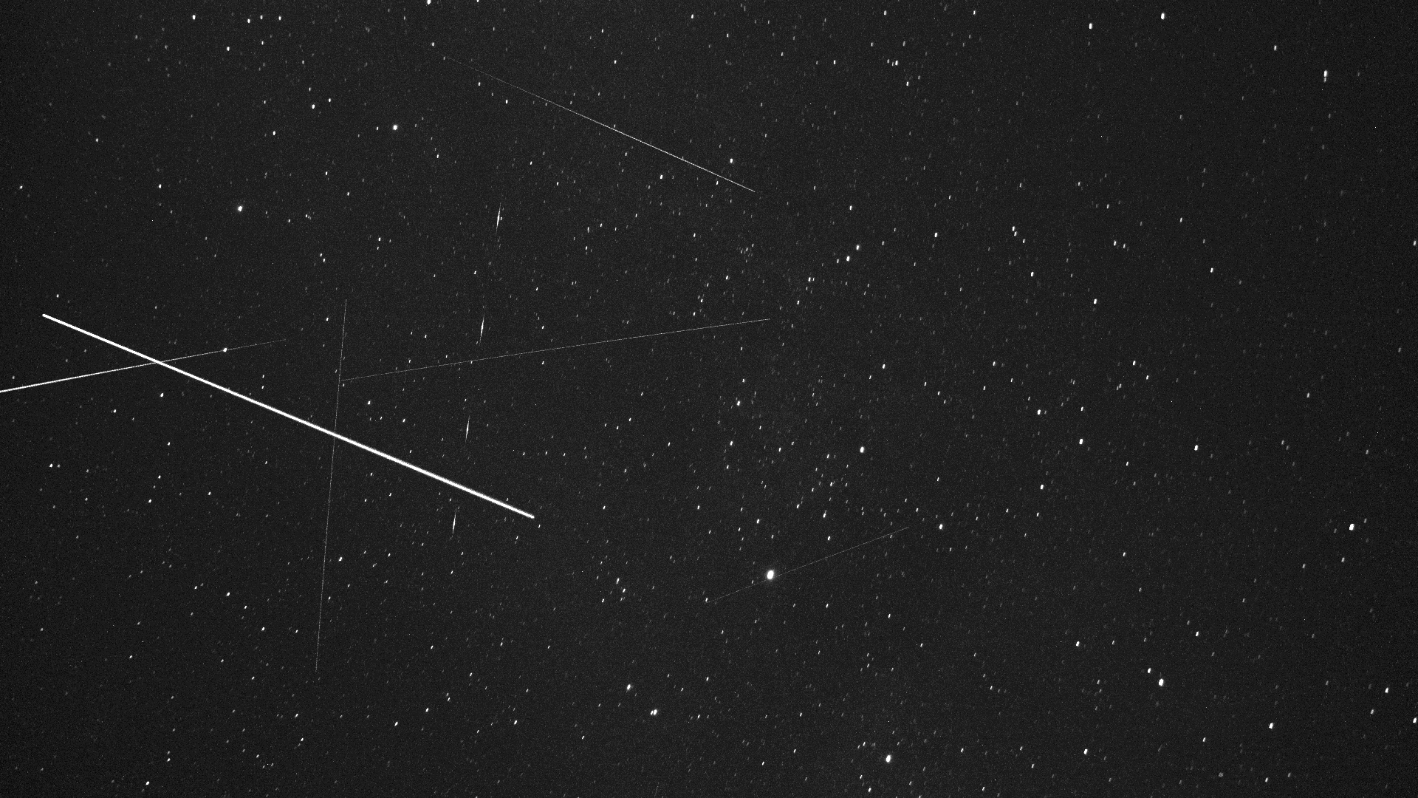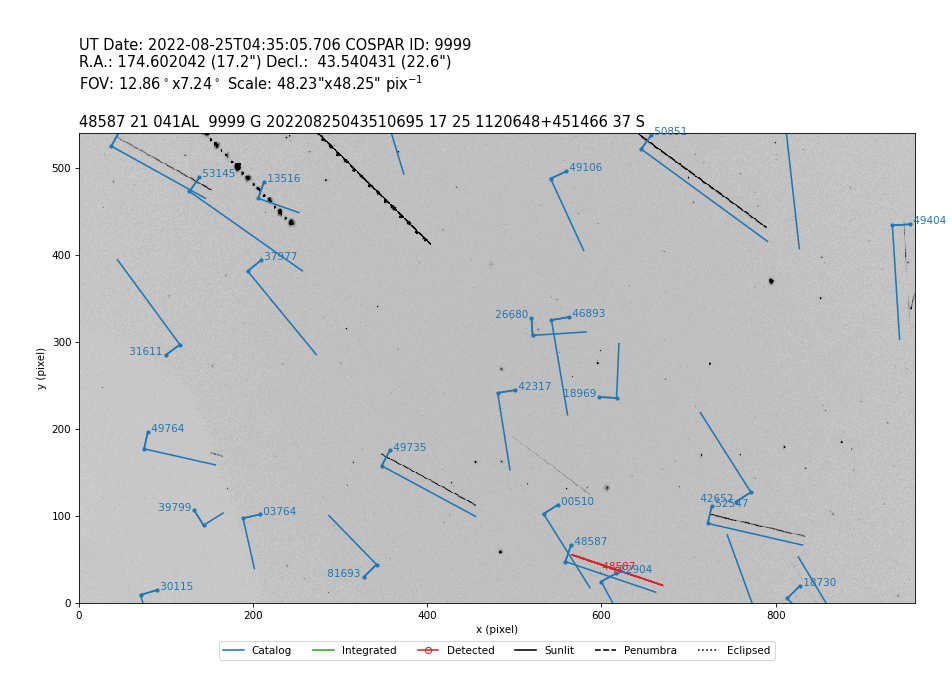| data | ||
| img | ||
| scripts | ||
| stvid | ||
| .gitignore | ||
| acquire.py | ||
| config_new-spacecruft.ini | ||
| config_new.ini | ||
| configuration.ini-dist | ||
| imgstat.py | ||
| keogram.py | ||
| LICENSE | ||
| preview.py | ||
| process.py | ||
| process_new.py | ||
| README-TIS.md | ||
| README-upstream.md | ||
| README.md | ||
| requirements.txt | ||
| setup.cfg | ||
| update_tle.py | ||
stvid
Fork/clone of cbassa's stvid.
NOTE: Unless you have a particular reason to use this, you should use the main upstream repository.
https://github.com/cbassa/stvid
Installation
Debian. Install package dependencies:
sudo apt install python3-virtualenv python3-pip python3-dev \
source-extractor astrometry.net \
libeigen3-dev giza-dev libx11-dev
Perhaps need some of the astrometry.net data files:
sudo apt install \
astrometry-data-tycho2 astrometry-data-tycho2-07 \
astrometry-data-tycho2-08 astrometry-data-tycho2-09 \
astrometry-data-tycho2-10-19
git clone https://spacecruft.org/spacecruft/stvid
# Or use upstream:
git clone https://github.com/cbassa/stvid
Optionally, set up python virtual environment:
cd stvid
virtualenv -p python3 env
source env/bin/activate
pip install --upgrade pip
Install dependencies. Numpy needs to be installed first, or the install fails.
pip install --upgrade numpy
pip install --upgrade -r requirements.txt
If the system python3-numpy conflicts, you could try installing
numpy in the virtualenv thusly:
pip install --upgrade --ignore-installed numpy
Debian in bug #941466 changed the name of the sextractor dependency to
source-extractor, so a symlink is needed for now:
sudo ln -s /usr/bin/source-extractor /usr/local/bin/sextractor
Install hough3d-code dependency:
cd ../
git clone https://gitlab.com/pierros/hough3d-code
cd hough3d-code
make all
sudo cp -p hough3dlines /usr/local/bin/hough3dlines
Install satpredict:
cd ../
git clone https://spacecruft.org/spacecruft/satpredict
# Or
#git clone https://github.com/cbassa/satpredict
cd satpredict/
make
sudo make install
Configure
Thusly...
cd stvid/
cp -p configuration.ini-dist configuration.ini
# Edit
# Note for fields st-username and st-password, *don't* use quotes.
# Set:
vi configuration.ini
Edit various configuration.ini fields:
# For example:
observer_cospar = 9999 # COSPAR number of observer's site
observer_name = Jeff Moe # Name of observer
observer_lat = 40.568912 # Latitude of location in decimal degrees
observer_lon = -105.225852 # Longitude of location in decimal degrees
observer_height = 1860 # Elevation of location in meters
observations_path = ./data/obs # Path for raw acquisitions
tle_path = ./data/tle # Path where TLEs are stored (and updated)
results_path = ./data/results # Path for results of processed obs
st-username = foo
st-password = bar
# Path to source-extractor
sex_config = /usr/share/source-extractor/default.sex
Store downloads here:
mkdir -p ./data/obs ./data/tle ./data/results
The ST_DATADIR variable is still used, from sattools.
Maybe set all these in ~/.bashrc (suit to fit directory setup):
export ST_DATADIR=$HOME/sattools
export ST_TLEDIR=$HOME/TLE
export ST_OBSDIR=$HOME/satobs
export ST_LOGIN="identity=foo@no:pass"
Set astrometry.net to run in parallel, assuming you have enough RAM:
(This doesn't appear to work? Breaks?).
sudo vim /etc/astrometry.cfg
# Uncomment:
inparallel
Hardware
Setup with various hardware.
Specs:
- Sony IMX174 or similar.
- 50mm lens.
- f1.2 to f1.6 (faster the better).
- 10Hz image sampling.
- USB-3 (or ethernet?).
For permanent mounts, considerations:
- IP-66 or better.
- PoE?
- 12V.
- Raspberry Pi, Intel NUC, Traverse Ten64.
- Hardware shutter during sunlight (?).
Proprietary examples with IMX174:
- QHYCCD QHY174GPS.
- ZWO ASI174MM.
The Imaging Source
The Imaging Source camera confirmed works well, such as this:
See README-TIS.md for more info.
Libre
Trying to find libre setup that can be used.
Solutions with gphoto or other non-video camera setups
should use stphot not stvid.
Proprietary
The ASI ZWO and QHY cameras use a proprietary SDK. There are no libre implementations found.
Web Cam
Perhaps like this using a web cam and OpenCV
Set up udev:
echo 'SUBSYSTEM=="video1", GROUP="video", MODE="0660"' |
sudo tee /etc/udev/rules.d/10-webcam.rules
Testing with Logitech BRIO usb web cam. No udev configuration needed.
Camera runs with stvid but isn't sensitive enough to be used.
Usage
Enter virtualenv, if used:
cd stvid/
source env/bin/activate
Get the latest TLEs:
./update_tle.py
Configure a position (example). XXX Best way to generate ?
echo \
'2022-08-07T23:44:14 R: 00:00:00.00 D: 00:00:00.0 H: -152.691 A: 180.000 E: 90.000 q: -28.18' |
> data/obs/control/position.txt
# Maybe
echo \
'2022-08-07T23:44:14 R: 00:00:00.00 D: 00:00:00.0 H: -152.691 A: 180.000 E: 90.000 q: -28.18' |
> $ST_DATADIR/data/position.txt
Acquire image, first download archives:
./acquire.py
 stvid acquired image, viewed with astroimagej.
stvid acquired image, viewed with astroimagej.
Preview
This scriptlet isn't in upstream. It does a preview of the camera using the
standard configuration file. So you can get a preview similar to what it actually
looks like for focus, perhaps. Does not require X running, but it does
need xinit installed.
Also need to set X11Forwarding yes in /etc/ssh/sshd_config.
Then login to your host with -XY ala:
ssh -XY odroidn2
cd stvid
source env/bin/activate
./preview.py
Fixed
When running acquire.py on amd64 architecture it gives this error:
OSError: libbcm_host.so: cannot open shared object file: No such file or directory
The libbcm_host.so is a (non-libre?) firmware file that is part of Raspberry Pi.
https://github.com/raspberrypi/firmware/blob/master/opt/vc/lib/libbcm_host.so
That error comes from installing picamerax on amd64, which was added to
requirements.txt, but should really just be when on Raspberry Pi.
env/lib/python3.10/site-packages/picamerax/bcm_host.py:_lib = ct.CDLL('libbcm_host.so')
For now, just import the library that calls for that binary if the Pi camera is used. No need to call it (and crash) if CV2 is used on non-Pi.
Upstream
See README-upstream.md.
stvid:
© 2018-2022 Cees Bassa
License
Same as upstream license, GPLv3.
© 2022, Jeff Moe
